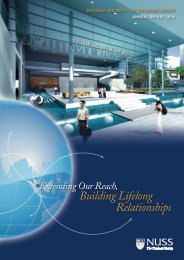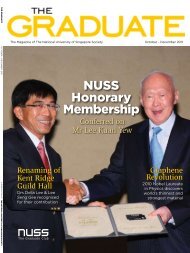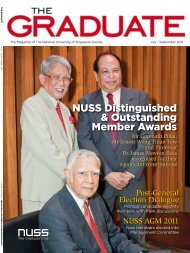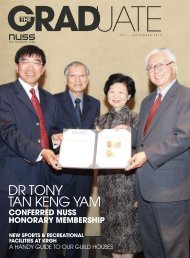The view from singapore with British High Commissioner to ... - NUSS
The view from singapore with British High Commissioner to ... - NUSS
The view from singapore with British High Commissioner to ... - NUSS
Create successful ePaper yourself
Turn your PDF publications into a flip-book with our unique Google optimized e-Paper software.
SwiM or Sink?<br />
cover s<strong>to</strong>ry<br />
as early as 1998, the Government was already prompted in<strong>to</strong><br />
taking action <strong>with</strong> our ageing population issues. Today, Singapore<br />
is facing a greying population and all the challenges that come <strong>with</strong><br />
it. Anthony Koh finds out how the crisis will hit some Singaporeans<br />
harder in their old age.<br />
It is the young who buy new<br />
gadgets, like iPhones or Android<br />
(phones), not old people<br />
like me,” said former Prime<br />
Minister Lee Kuan Yew at the<br />
recent Russia-Singapore Business<br />
Forum on the importance for countries<br />
<strong>to</strong> grow their population. Catherine<br />
Mayer who coined the term<br />
‘amortality’ in her Time Magazine<br />
feature has, however, a different<br />
observation of old people. Amortals,<br />
as she called them, no longer<br />
conform <strong>to</strong> age-appropriateness;<br />
instead, they continue <strong>to</strong> “chase<br />
aspirations and covet new goods<br />
and services”.<br />
Today, there are more people<br />
who are above 60 than those under<br />
15. According <strong>to</strong> the United Nations<br />
Population Division, demographic<br />
change in Asia will be the most<br />
dramatic. <strong>The</strong> population of those<br />
65 and above in this region will<br />
tHe<br />
experience a 314 percent increase<br />
<strong>from</strong> 207 million in 2000 <strong>to</strong> 857<br />
million in 2050. As of 2009, Japan<br />
was ranked the country <strong>with</strong> the<br />
highest percentage of population<br />
aged 60 and over. Though this<br />
group constitutes 15.2 percent in<br />
Singapore (almost half of Japan’s),<br />
our 54th position still ranked<br />
us higher than Korea, Thailand<br />
and Malaysia. A report <strong>from</strong> <strong>The</strong><br />
Committee on Ageing Issues (CAI)<br />
revealed that one in five residents<br />
in Singapore will be 65 and above<br />
by 2030. From 2020 till then, the<br />
projected increase for this age group<br />
is 310,000 or 65 percent.<br />
Fast ageing <strong>singapore</strong>: causes<br />
and effects<br />
Developed countries become rich<br />
first before ageing; developing<br />
countries age first before becoming<br />
rich. Thus, developed countries<br />
are more likely <strong>to</strong> cope better<br />
<strong>with</strong> the challenges of caring for<br />
their old than poorer and lessdeveloped<br />
countries. It will take<br />
a <strong>to</strong>me <strong>to</strong> explain why some<br />
countries age faster than the<br />
others as demographic issues<br />
are wide-ranging. However, we<br />
can deduce the causes based on<br />
emerging trends which mostly<br />
point <strong>to</strong> declining fertility rates and<br />
increased life expectancy.<br />
<strong>The</strong> average Singaporean now<br />
lives 20 years longer than their<br />
predecessors <strong>from</strong> the 1960s.<br />
Today, male residents who are 65<br />
can live till 82 years <strong>with</strong> women<br />
living an additional four years<br />
longer. This creates an ageing<br />
problem peculiar <strong>to</strong> women (see<br />
box on page 8). <strong>The</strong> issue then lies<br />
in the daunting task of supporting<br />
a greying population vis-à-vis our<br />
declining fertility rate.<br />
Jan-Mar 2013 THE GRADUATE 5









